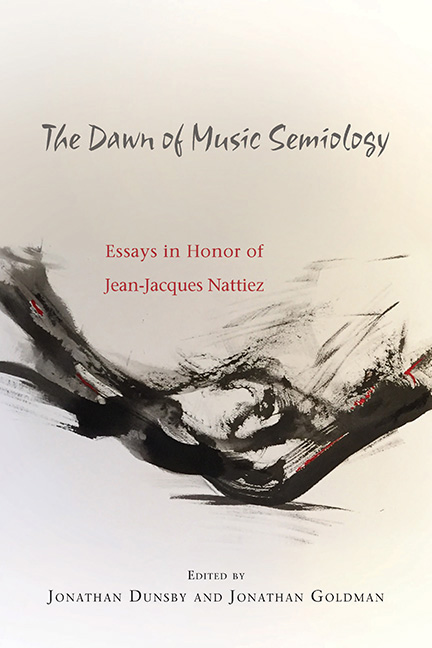Book contents
- Frontmatter
- Contents
- Foreword: About Jean-Jacques Nattiez
- Acknowledgments
- Introduction
- Part One Metaconsiderations
- 1 Music and Gesture
- 2 Music Semiology in the Mind of the Musician
- 3 Against Ethnotheory
- Part Two Poietic Channels
- Part Three Esthesic Excursions
- Selected Bibliography of Works by Jean-Jacques Nattiez
- List of Contributors
- Index
- Tabula Gratulatoria
3 - Against Ethnotheory
from Part One - Metaconsiderations
Published online by Cambridge University Press: 26 April 2018
- Frontmatter
- Contents
- Foreword: About Jean-Jacques Nattiez
- Acknowledgments
- Introduction
- Part One Metaconsiderations
- 1 Music and Gesture
- 2 Music Semiology in the Mind of the Musician
- 3 Against Ethnotheory
- Part Two Poietic Channels
- Part Three Esthesic Excursions
- Selected Bibliography of Works by Jean-Jacques Nattiez
- List of Contributors
- Index
- Tabula Gratulatoria
Summary
Nattiez's Ambivalence
In his 1990 monograph, Music and Discourse: Toward a Semiology of Music, Jean- Jacques Nattiez welcomed “a new interest in ‘ethnotheories’” as “one of the great virtues of ethnomusicology's anthropological orientation.” By their very existence, ethnotheories, defined as “conceptions that indigenous peoples form of their own music,” suggest that “the ‘savage mind’ can also operate in the realm of music theory, with a precision that is a bit disturbing for smug Western feelings of superiority.” The context in which these statements appear is a broad semiological study of a variety of discourses about music. Nattiez reflects on the very concept of music and the musical work, the nature of musical meaning, and musical analysis in theory and practice. Along the way, he invokes writers as diverse as Charles Sanders Peirce, Nicolas Ruwet, Alan Lomax, Eduard Hanslick, Umberto Eco, Paul Ricouer, Jean Molino, Bernhard Riemann, and Andre Schaeffner; and music by Karlheinz Stockhausen, Richard Wagner, the Inuit, the Kaluli, and the Igbo. In other words, as early as 1990, Nattiez's purview was “world music,” and it is against this cosmopolitan background that we might interpret his remarks.
Ethnotheories (the plural is hardly avoidable at this level) are typically reported in ethnographically based studies by “western” scholars of knowledge systems developed within cultures of (mainly) primary orality. They purport to show a high level of verbal and conceptual precision in the way that indigenous people think and talk about music. Nattiez lists writings by Feld, Keil, Powers, Sakata, Smith, Stone, Tedlock, and Zemp as the most significant contributions. Although welcoming of this new development, Nattiez was also skeptical. On one side was a positive valuation of the idea of ethnotheory, responding perhaps to an ethical imperative to respect native conceptualization; on the other side was skepticism about ethnotheory's intellectual cogency, especially when its claims came into conflict with scientific knowledge: “When an Inuk says that the throat is the point of origin of sound in Katajjaq, but modern articulatory phonetics (Ladefoged) states that there are no guttural sounds as such, I am hard put to imagine what guilt complex about ethnocentricity could allow privileging the informants’ illusion above a well-established physiological fact.”
- Type
- Chapter
- Information
- The Dawn of Music SemiologyEssays in Honor of Jean-Jacques Nattiez, pp. 38 - 56Publisher: Boydell & BrewerPrint publication year: 2017



